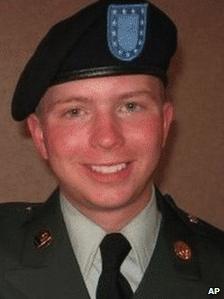Accused Wikileaks source Manning moved to US for trial
- Published

Pfc Bradley Manning has been described as a "person of interest" in the Wikileaks Afghan document leak
A soldier accused of leaking video of a deadly helicopter attack in Iraq has been transferred to a base in the US.
US Army Pfc Bradley Manning is to stand trial on charges he gave video of the attack, which killed a Reuters photographer, to the website Wikileaks.
The Pentagon is also investigating whether he gave the site 90,000 documents on the war in Afghanistan.
On Friday a White House aide begged whoever possessed the Afghan files not to release any more.
"It's important that no more damage be done to our national security," Robert Gibbs said on NBC's Today show.
The US Army said on Friday that Pfc Manning, 22, had been moved from Kuwait to Quantico Marine Base in Virginia, where he will be held pending trial.
The Pentagon said this week investigators were extending the helicopter attack video investigation to find out whether Pfc Manning was involved in leak of the Afghanistan documents, with a spokesman describing him as a "person of interest".
'Afghan blood'
But a Pentagon spokesman has said the investigation is "broader" than Pfc Manning.
The US government maintains the massive dump of documents onto the website put lives at risk.
"We can do nothing but implore the person that has those classified top secret documents not to post any more," Mr Gibbs said on Friday.
And, on Thursday, Chairman of the US Joint Chiefs of Staff Admiral Mike Mullen said: "The truth is [Wikileaks] might already have on their hands the blood of some young soldier or that of an Afghan family."
Wikileaks founder Julian Assange has dismissed the accusation, saying the US government has presented no evidence innocent people or informants have been harmed by the leaks.
Speaking to the BBC's Newshour programme, he said: "One must consider why the Pentagon is focusing on the hypothetical blood that it says might be on our hands - although there is no evidence of that - compared to the 20,000 lives that have been lost in Afghanistan that are documented and exposed by our material."
He said his organisation had tried hard to reduce the possibility of harm occurring and had sought to engage the White House in its efforts to vet the material before it was released.
He has pledged to continue document releases.
"We will not be suppressed," he said. "We will continue to expose abuses by this administration and others."
The documents, which Wikileaks have called the Afghan War Diary, external, were first described in news reports late on Sunday.
Among other revelations, they describe in new detail civilian deaths, claim members of Pakistan's Inter-Services Intelligence agency have backed the Taliban in Afghanistan, and state the Taliban has used surface-to-air missiles to down coalition aircraft.
- Published14 July 2010
- Published30 July 2010
- Published27 July 2010